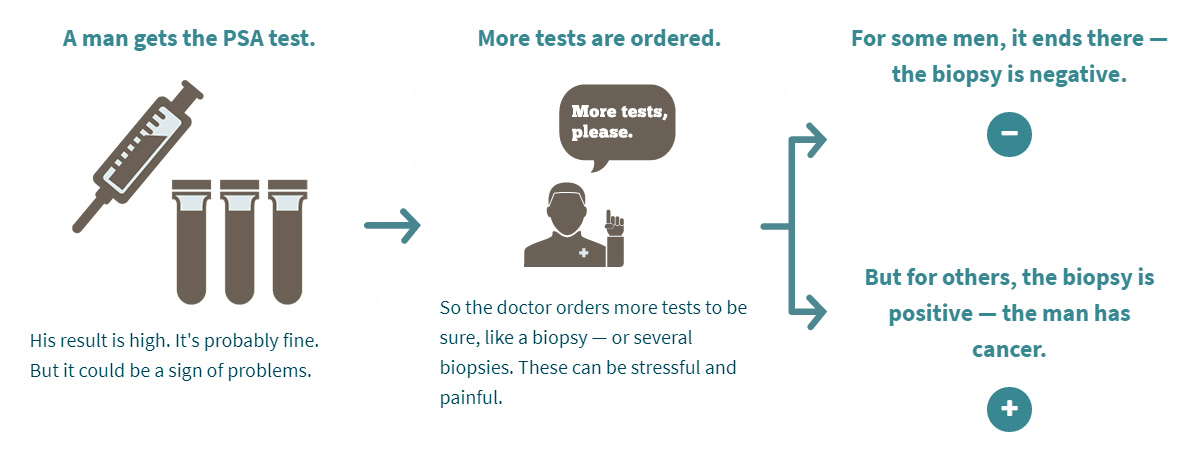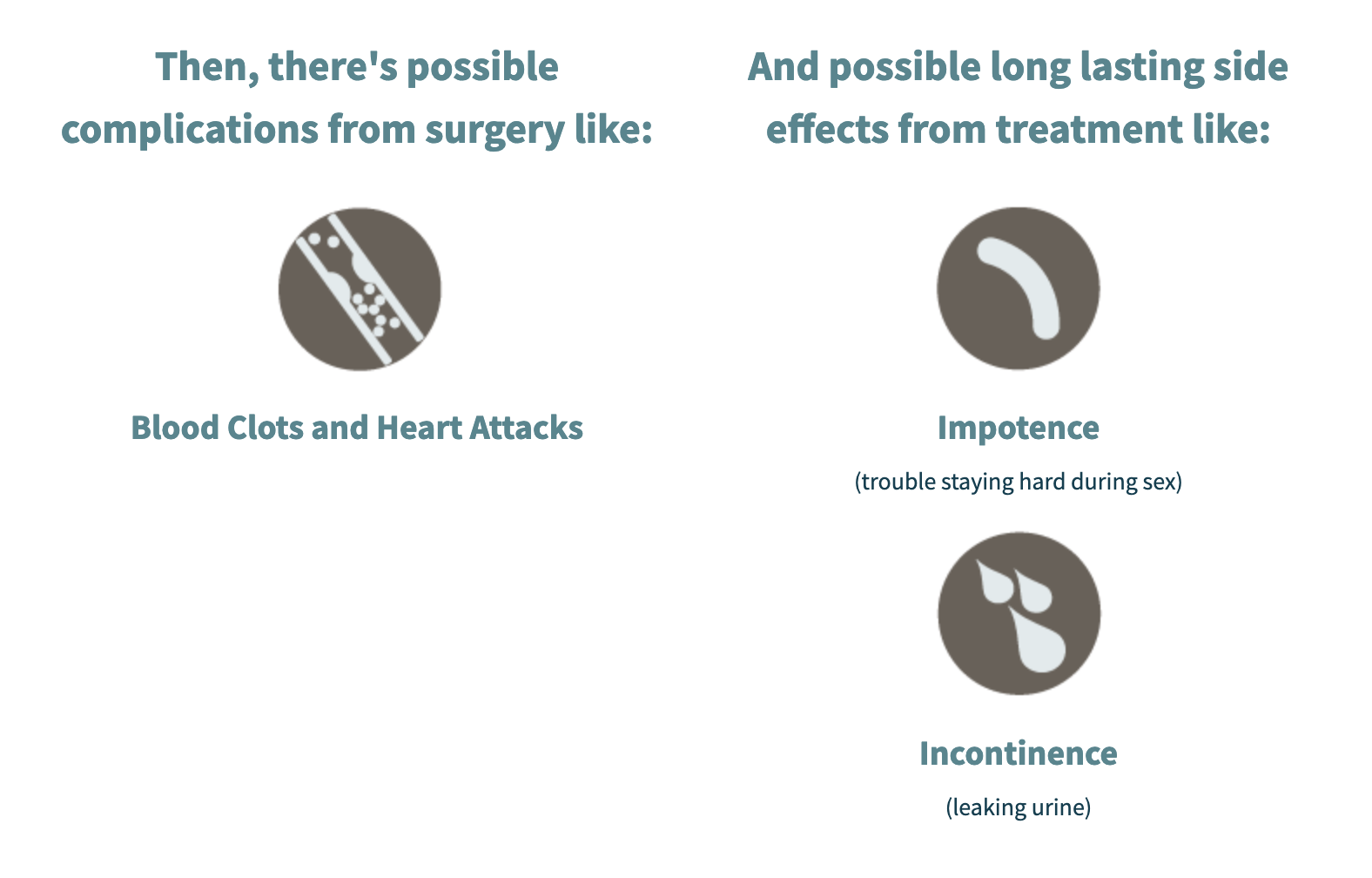 Men: You have a choice to make about your prostate health.
Men: You have a choice to make about your prostate health.
The PSA blood test may help find prostate cancer, but it's not a test every man should get. Find out why.
Get the facts to help you talk with your doctor and make the right choice for you.
What is Prostate Cancer?
The prostate is a small gland in a man’s body near the bladder. It surrounds the tube (the urethra) that carries urine out of the body. The prostate helps make the fluid in semen, which carries sperm.
Prostate cancer happens when prostate cells start growing abnormally.
How common is prostate cancer?
Lots of men have prostate problems as they get older. Most aren’t serious, but prostate cancer is a risk. In men, it’s the most common type of cancer and the second most common cause of cancer death.
But the numbers can be misleading. While prostate cancer is very common, most prostate cancer is actually harmless. With most prostate cancer, you can just leave it alone and it would never spread.
Fast and slow-growing cancers
Here’s the problem. It can be hard for doctors to tell the difference between slow-growing prostate cancer that will never need treatment and fast-growing cancer that needs treatment right away. The tests we have — like the PSA test — don’t give clear answers.
So, many men get treatment either way. That usually means radiation or surgery. Some men choose active surveillance — you wait and keep getting tested to see if the cancer gets worse. If it does, then you get treatment.
See your doctor if you have symptoms like:
- Problems urinating, like a weak flow
- Having to urinate more often, especially at night
- Blood in your urine
- Leaking urine or losing bladder control (incontinence)
Many health conditions can cause these symptoms besides prostate cancer. It’s still important to get them checked out by your doctor. Symptoms are not the best way to detect prostate cancer early.
About the PSA Test
What’s the PSA test?
It’s a blood test. It checks for levels of protein (prostate-specific antigen) made by a man’s prostate. Sometimes a high level may indicate an increased risk of prostate cancer.
What’s the Problem?
If you have a high PSA level, it could lead to more tests such as a biopsy and treatment for cancer that may not be necessary.
What do I do?
Talk about the test with your doctor. Learn about the possible benefits and harms, and about your individual risk for prostate cancer. Then decide if the test is right for you.
Here's what research tells us about the PSA test now.
Pros
The PSA test may help you catch a harmful type of cancer early — possibly saving your life.
The earlier you detect that type of cancer, the better treatment may work.
If you are at higher risk for prostate cancer, it may be more beneficial to you.
Cons
It’s not clear that the PSA test saves lives because research shows that the PSA test doesn’t always give you the right answer.
We know that the PSA test can lead to other tests and treatments that have the risk of serious side effects — tests and treatments that may not be necessary.
How can a blood test have risks?
What’s the harm of a simple blood test? If you get a high result, the test won’t tell you why.
So to make sure you’re OK, you might get a painful biopsy. Biopsies can sometimes lead to surgery or radiation — and side effects — that you could have avoided.
Over your lifetime, your:
Risk of developing prostate cancer:
1 in 7
Risk of dying from prostate cancer:
1 in 38
The PSA test may not give you clear answers.
3 out of 4 men
with a high PSA level don’t actually have prostate cancer.
1 out of 7 men
with a normal PSA level actually do have prostate cancer.
What increases your risk of prostate cancer?
Race.
Prostate cancer occurs more often in African-American and black men than in men of other races. African-American men are also 2 times as likely to die of prostate cancer as white men.
Family history.
Having a close relative who had prostate cancer raises your risk 2 to 3 times.
Age.
The risk of prostate cancer goes up as you get older — especially after age 50.
Do you need the PSA test?
You and your doctor need to decide together.
Whether you’re answering for yourself or for a loved one, review the following questions to help you think more about the PSA test.
For your privacy, we do not record any of your answers.
How old are you?
Prostate cancer is very rare in men under age 40. Your risk rises as you get older — especially after age 50.
Are you...?
African American and black men have the highest risk of getting prostate cancer and dying from it. Caucasians have an average risk. Asians and Hispanic or Latino men have a lower than average risk. Source: CDC. Prostate Cancer Rates by Race and Ethnicity. Retrieved June 26, 2014.
Do you have a family history of prostate cancer?
If you have a close relative with prostate cancer — especially your brother or father — your risk is 2 to 3 times higher. The more relatives who had it, the higher your risk, especially if they were young when they got it.
How worried are you about the long-lasting side effects (incontinence, impotence)?
The side effects of treating cancer are important to think about. Because some types of prostate cancer are slow-growing, treatment may not provide you with any benefit and could cause more harm. Talk to your doctor about what happens after being diagnosed with prostate cancer.
How confident do you feel about talking to your doctor about the PSA test?
No matter how confident you are about which questions to ask, your doctor should want to discuss any concerns or worries you may have. Click on the box below for a list of questions to help get you on the right track.
Questions to ask your doctor
- Am I at high risk for prostate cancer?
- If I took the PSA test and my result was high, what would you suggest next?
- Have there been any changes in how doctors use PSA testing?
- Are there any symptoms of prostate problems I need to watch for?
- What changes could I make to my habits to lower my risk of prostate problems?
- Are there any drawbacks to skipping the test for now and deciding later?
To help you make a choice about the PSA test, read what five men decided after talking to their doctors — and why. Some got the test and some didn’t. Who made the right choice? They all did.
My dad died from prostate cancer, so I have a family history. I saw what he went through, and it was tough. I don’t want to put my family through that. So I’m getting the test.
I’m not getting the test. A friend got prostate surgery and 10 years later, he’s still having side effects, wearing adult diapers and having problems in the bedroom. He regrets it. Most prostate cancer grows so slowly, he says he probably never needed treatment.
I chose to get the test. My doctor and I decided it made sense. I like to know the facts. If I had prostate cancer, even if it’s slow-growing, I'd want to know. I get that treatment can have side effects, but to me, it’s worth it to be sure.
I’m not getting the test. I talked it over with my doctor. For me, the bottom line is that there’s no clear evidence getting the test helps men live longer. If it doesn’t do that, why get it? Especially with the risks of those side effects.
I’m not sure about PSA test. Seems like the experts can’t agree about whether it’s a good idea. I talked to my doctor and he said it was fine to wait for now. I’m going to check back next year. I want to have better answers before I decide.”
Questions to ask your doctor
Research about the PSA test isn’t clear. So the smart move is to talk to your doctor and decide together. Start the conversation:
Print out these questions and bring them to your next appointment.
- Am I at high risk for prostate cancer?
- If I took the PSA test and my result was high, what would you suggest next?
- Have there been any changes in how doctors use PSA testing?
- Are there any symptoms of prostate problems I need to watch for?
- What changes could I make to my habits to lower my risk of prostate problems?
- Are there any drawbacks to skipping the test for now and deciding later?









